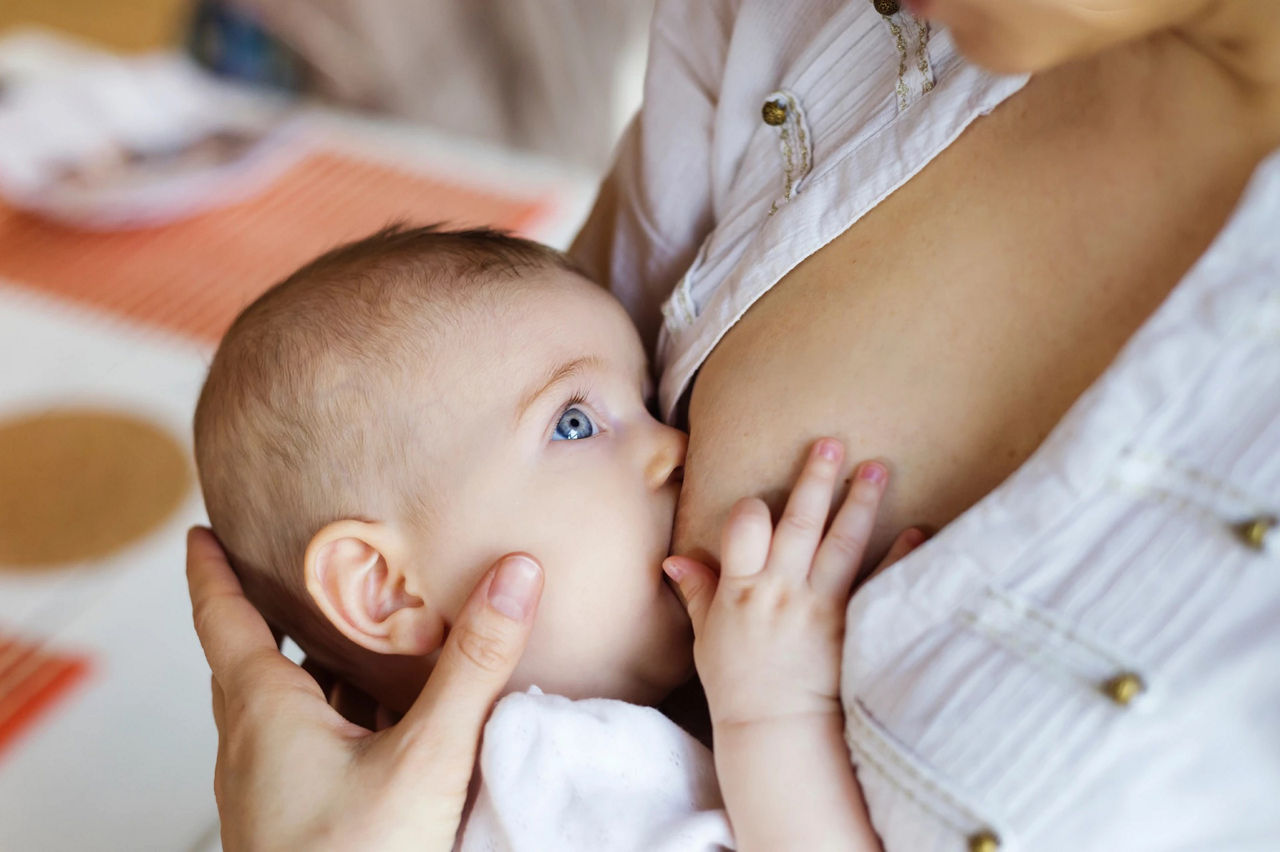Benefits of breastfeeding
Breastfeeding provides many benefits for you and your baby, from better health outcomes to saving money. Here at Aptaclub we believe breastfeeding is best and have collected this information for you so you can see this too! Breast milk provides the perfect nutrition for your baby and has many other benefits for not just your baby, but you as well!

Advantages of breastfeeding for baby
Helps to protect your baby from infections, as breast milk contains immune factors1.
- Straight after birth and for the first few days of breastfeeding, your breast milk contains colostrum, which is full of antibodies that help protect your baby from infections2.
- Continuing breastfeeding is important to make sure your baby will benefit from the antibodies in your breast milk on an ongoing basis. As you come into contact with new infections, your baby will automatically get some immunity from them too.
Helps your baby become a lifelong healthy eater3
- Your breast milk is uniquely tailored to your baby and, incredibly, the food you eat while breastfeeding can influence their taste preferences throughout weaning and beyond4,5.
Helps reduce your baby’s chances of having diarrhoea or vomiting6
Helps reduce the risk of many diseases for your baby:
- Sudden infant death syndrome (SIDS)7
- Type 2 diabetes8
- Childhood leukaemia9
May help reduce risk of diseases later in life, including:
- Cardiovascular disease10
- Eczema, asthma and other allergies11
- Obesity12

Benefits of breastfeeding for mother
Helps you to lose any weight gained during pregnancy, as you burn ~500 extra calories a day while exclusively breastfeeding13
Helps to strengthen the bond between you and your baby14
- Holding your baby while they're feeding provides intimacy through skin-to-skin contact.
- This closeness comforts your baby whilst helping to regulate their heart beat and body temperature.
Lowers your chances of post-partum depression15
Lowers your chances of ovarian cancer16
Lowers your chances of breast cancer17

The Science behind oxytocin, powered by Nutricia
When your baby suckles at your breast, the stimulation causes your body to release a surge of oxytocin to your brain. Oxytocin, also known as the ‘love hormone’, may trigger a rush of caring emotions, helping you form a loving bond with your baby.
Other advantages of breastfeeding
- Saves you time – as there’s no need to sterilise bottles and other feeding preparation
- Saves you money – no equipment needed
- No need to carry feeding equipment, and therefore can be an easier option than pumping or formula.

7 wonderful breastfeeding facts that might surprise you:
Breast milk is incredible, multifaceted, and fascinating. It’s been inspiring our research for 40 years. And as we’re able to discover more and more about its composition, more unexpected and amazing properties are being revealed.
Your breast milk is totally unique to you
Its composition is determined by factors including your diet, hormones, genetics, environmental influences, and the needs of you and your baby18.
Your baby recognises the smell of your breast milk
The scent of your breast milk prompts your newborn to show searching behaviours20. And, amazingly, they can sense and process information contained in your milk21.
Your breast milk can help your baby sleep
The scent of your breast milk prompts your newborn to show searching behaviours20. And, amazingly, they can sense and process information contained in your milk21.
Breastfeeding makes your ‘love hormones’ rise
The skin-to-skin contact of breastfeeding is thought to help with bonding, but scientists have also discovered that your oxytocin levels go up while you breastfeed. This is thought to help increase your feelings of love towards your child23.
Breast milk helps your baby have a healthier future
Breast milk is filled with germ-fighting antibodies2. It can reduce the risk of developing eczema, asthma, allergies and obesity in later life11,12, while prolonged breastfeeding helps reduce the lifelong risk of heart disease10.
Breast milk can help your baby become a lifelong healthy eater
Your diet can directly influence the composition of your breast milk. And the foods you eat while breastfeeding could influence the tastes your baby enjoys throughout weaning and beyond4,5.
Breast milk is different for sons and daughters
Did you know that boys consume more of their mother’s milk than girls? And amazingly, the breast milk produced for boys contains 25% more calories than for girls.24
related articles
Learn more about breastfeeding

Need some help?
You can get quick answers to common questions in our FAQs.
Alternatively, if you need help with general pregnancy or baby advice, or maybe on using or ordering our products - our expert team are always on hand to talk about feeding your baby.
- McClure et al. (2011), Obesity (Siver Spring),19, 2205-13.
- Sadeharju, K. et al. Pediatrics, 2007;119(5):941-946.
- Beauchamp GK, Mennella JA. J Pediatr Gastroenterol Nutr 2009;48(Suppl 1):S25-30.
- Mennella JA et al. Pediatrics 2001;107(6):E88.
- Beauchamp GK, Mennella JA. Digestion 2011;83(Suppl 1):1-6.
- Weinburg, R., Tipton, G., Klish, W. and Brown, M. Pediatrics, 1984;74(2):250-253.
- Ford, R., et al. Int J Epidemiol 1993;22(5):885-890.
- Owen, C., et al. Am. J. Clin. Nutr. 2006;84(5):1043-1054.
- Kwan, M., Buffler, P., Abrams, B. and Kiley, V. Public Health Rep, 2004;119(6):521-535.
- Rich-Edwards, J., et al. Epidemiology, 2004;15(5):550-556.
- Kull I, Wickman M, Lilja G, et al. Arch. Dis. Child. 2002;87:478-481.
- Koletzko B. et al. Adv Exp Med Biol, 2009;646. Springer, Dordrecht
- NHS. Why Breastfeed? [Online]. 2012. Available at: www.nhs.uk/conditions/pregnancy-and-baby/pages/why-breastfeed.aspx [Accessed: April 2014]
- Uvnäs-Moberg K et al. Acta Obstet Gynecol Scand 1990;69:301-6.
- Dias, C. and Figueiredo, B. J Affect Disord 2015;171:142-154.
- Luan, N., et al. Am. J. Clin. Nutr. 2013;98(4):1020-1031.
- Collaborative Group on Hormonal Factors in Breast Cancer. The Lancet, 2002;360(9328):187-195.
- Ballard, O., & Morrow, A. L. Human milk composition: nutrients and bioactive factors. Pediatr. Clin. North Am. 2013;60(1):49–74.
- Nishitani S et al. Neurosci Res 2009;63:66-71.
- Porter RH, Winberg J. Neurosci Biobehav Rev 1999;23(3):439-49.
- Schaal B et al. Olfactory cognition at the start of life: the perinatal shaping of selective odor responsiveness. In: Schaal B (ed). Olfaction, Taste, and Cognition. West Nyack, NY (U.S.A.): Cambridge University Press, 2002.
- White, R. (2017). Breastfeed Med, 12(7):398-400.
- Uvnäs-Moberg K et al. Acta Obstet Gynecol Scand 1990;69:301-6.
- Powe CE et al. Am J Hum Biol 2010;22(1):50-4.
Last reviewed: 13th July 2020
Reviewed by Nutricia’s Medical and Scientific Affairs Team



